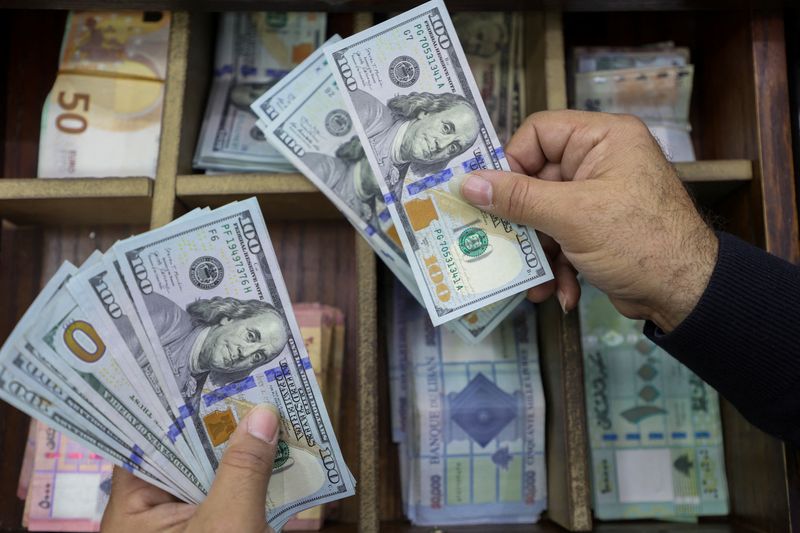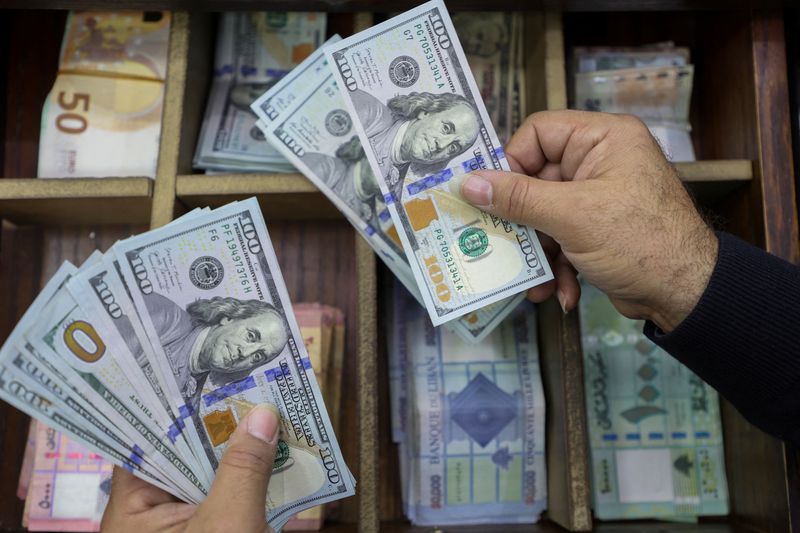Forex
Rising dollar pressures peers as further Fed rate cuts questioned

By Samuel Indyk and Rae Wee
LONDON (Reuters) -The U.S. dollar rose on Monday, driving its peers to multi-year lows, after Friday’s blowout U.S. jobs report underscored the strength of the economy and muddied the outlook for further Federal Reserve rate cuts this year.
The , which measures the U.S. unit against a basket of currencies, surged to its highest in more than two years on Monday to peak at 110.17, extending the recent rally.
Friday’s data showed U.S. job growth unexpectedly accelerated in December and the unemployment rate fell to 4.1%, leaving traders heavily scaling back bets of Federal Reserve rate cuts this year.
Markets were now no longer fully pricing in even one rate cut from the Fed in 2025, down from roughly two quarter-point cuts priced at the start of the year.
With Wednesday’s reading on U.S. inflation up next, any upside surprise could further close the door on future easing. A slew of Fed officials are also due to speak this week.
“If you look back at the last year there were worries and signs that there were cracks in the labour market emerging, but they seem to have been fully plastered, not just papered over,” said Dominic Bunning, head of G10 FX strategy at Nomura.
“The U.S. economy is resilient enough to justify a strong dollar and justify relatively higher rates.”
Adding to expectations of a less aggressive easing cycle is the view that President-elect Donald Trump’s plans for hefty import tariffs, tax cuts and immigration restrictions could stoke inflation. He returns to the White House in a week.
The euro hit its weakest level against the dollar since November 2022 at $1.0177, while sterling was one of the biggest losers, sliding as much as 0.7% to a 14-month low of $1.21.
The pound has been under pressure from concerns over rising borrowing costs and growing unease over Britain’s finances. It tumbled 1.8% last week.
“The overriding view remains that the UK government will probably be forced to announce spending cuts on 26 March,” said Chris Turner, global head of markets at ING.
“This will feed into a tighter fiscal/looser monetary/weaker sterling narrative.”
Elsewhere, the Australian dollar sank to its weakest since April 2020 at $0.6131. The New Zealand dollar last traded at $0.5544, languishing near a more than two-year low.
BEIJING STEPS IN
The yuan meanwhile bucked the global trend and rose slightly on Monday after Beijing stepped up efforts to defend the weakening currency by relaxing rules to allow more offshore borrowing and sending verbal warnings.
The rose 0.1% to 7.3576 per dollar.
Monday’s moves by the People’s Bank of China follow its suspension on Friday of treasury bond purchases, which briefly lifted yields and spurred speculation it is stepping up defence of the yuan.
“The PBOC is doing whatever it takes to maintain RMB stability,” said Christopher Wong, a currency strategist at OCBC.

The Chinese currency has come under renewed pressure in part due to investors’ disappointment over the lack of further stimulus from Beijing to shore up its struggling economy.
Elsewhere, the yen similarly rose 0.2% to 157.37. The yen’s decline was mitigated by news that Bank of Japan policymakers could raise their inflation forecast at a policy meeting this month as a prelude to hiking rates again.

 Forex3 years ago
Forex3 years agoForex Today: the dollar is gaining strength amid gloomy sentiment at the start of the Fed’s week

 Forex3 years ago
Forex3 years agoUnbiased review of Pocket Option broker

 Forex3 years ago
Forex3 years agoDollar to pound sterling exchange rate today: Pound plummeted to its lowest since 1985

 Forex3 years ago
Forex3 years agoHow is the Australian dollar doing today?

 Cryptocurrency3 years ago
Cryptocurrency3 years agoWhat happened in the crypto market – current events today

 World3 years ago
World3 years agoWhy are modern video games an art form?

 Commodities3 years ago
Commodities3 years agoCopper continues to fall in price on expectations of lower demand in China

 Economy3 years ago
Economy3 years agoCrude oil tankers double in price due to EU anti-Russian sanctions





















